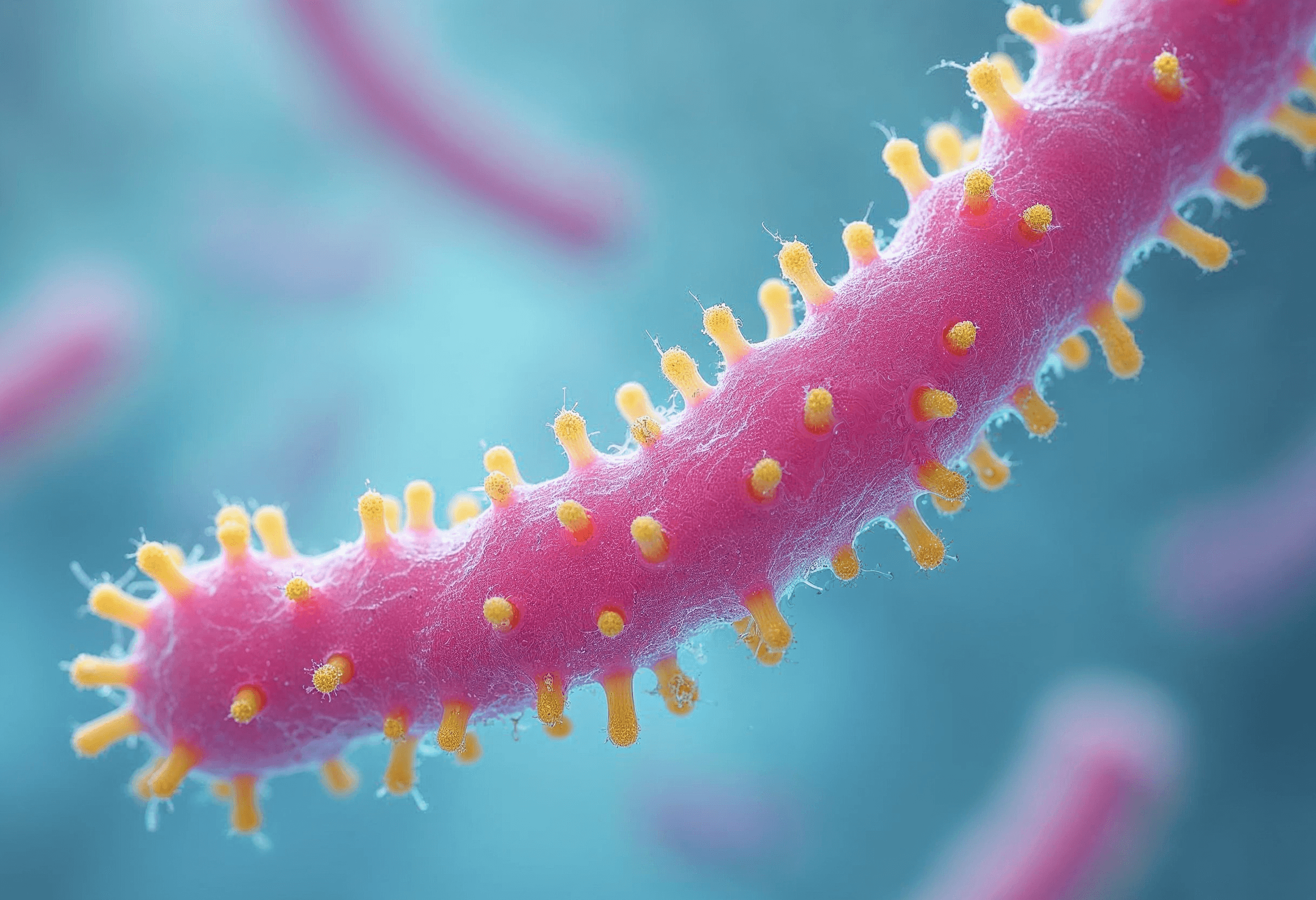E. coli infections can appear suddenly and cause serious discomfort, making it important to recognize the first signs early. These infections are often linked to foodborne illnesses, contaminated water, or direct contact with infected people or animals. By learning about the symptoms and prevention measures, you can act quickly to stay safe and healthy.
For delicious, safe meals, explore recipe inspirations.
What Is E. coli?
Different Types of E. coli
E. coli, short for Escherichia coli, is a group of bacteria found in the intestines of humans and animals. While most strains are harmless, some, like E. coli O157:H7, can cause illness. These harmful strains produce toxins that lead to food poisoning and other infections.
How It Spreads
E. coli spreads mainly through contaminated food or water. It can also pass from person to person through poor hand hygiene. Raw or undercooked foods, especially beef and unwashed vegetables, are common sources.
First Signs of E. coli Infection
Recognizing the first signs of an E. coli infection is critical for seeking timely treatment. Early symptoms often appear within 1 to 10 days after exposure, depending on the strain and the person’s overall health. Let’s explore the most common early indicators.
Common Early Symptoms
The first signs are typically mild but can escalate quickly if not addressed. Early symptoms include:
- Fatigue: Feeling unusually tired without much exertion.
- Mild Stomach Discomfort: A dull ache in the abdomen that might worsen over time.
- Loss of Appetite: Reduced interest in eating or difficulty digesting food.
These initial symptoms might not always seem serious but are often the body’s first reaction to the infection.
Gastrointestinal Symptoms
E. coli infections often target the digestive system. The following symptoms are usually the most noticeable:
- Diarrhea: Starting as mild but often becoming watery or bloody within a few days.
- Stomach Cramps: Sharp, persistent pains that can feel intense.
- Nausea and Vomiting: These may occur as the body tries to expel harmful bacteria.
These signs typically indicate the bacteria’s impact on the gastrointestinal tract.
Other Possible Signs
Although less common, some people experience:
- Low-Grade Fever: A slight rise in body temperature that may signal an immune response.
- Dehydration: Dry mouth, reduced urination, and dizziness from fluid loss due to diarrhea or vomiting.
- Headaches: These can result from dehydration or the strain of fighting an infection.
Not everyone will experience the same symptoms, so it’s important to stay alert if you suspect exposure to E. coli.

Who Is Most at Risk?
Understanding who is most at risk can help in recognizing and managing infections effectively.
High-Risk Groups
Some individuals are more likely to develop severe symptoms, including:
- Young Children: Their developing immune systems make them more vulnerable.
- Older Adults: Aging can weaken immune responses, increasing risks.
- Pregnant Women: Infections may pose additional risks to both mother and baby.
- People with Weakened Immunity: Those undergoing treatments like chemotherapy or living with chronic illnesses.
Situations That Increase Risk
Certain conditions or behaviors can heighten the chances of contracting E. coli:
- Eating High-Risk Foods: Raw or undercooked meats, unpasteurized dairy, and unwashed produce.
- Traveling to Areas with Poor Sanitation: Consuming unsafe water or food during travel.
- Close Contact with Infected Individuals: Caring for someone with an active infection or poor hygiene practices.
Complications of E. coli Infection
While most E. coli infections resolve on their own, certain cases can lead to serious complications. Understanding these risks helps in taking timely action.
Serious Health Risks
Some harmful strains, like E. coli O157:H7, produce toxins that can cause severe illnesses. The most concerning complications include:
- Hemolytic Uremic Syndrome (HUS): A condition where toxins damage red blood cells, leading to kidney failure. HUS is more common in children and older adults.
- Sepsis: If the bacteria spread to the bloodstream, it can result in life-threatening infections.
- Long-Term Kidney Problems: Even after recovery, kidney damage caused by E. coli toxins can have lasting effects.
Recognizing Severe Symptoms
Signs that an infection may be worsening include:
- Severe or Persistent Diarrhea: Especially if it is bloody or lasts more than three days.
- High Fever: A temperature above 101.5°F (38.6°C).
- Decreased Urination: A possible sign of kidney damage.
- Extreme Fatigue or Confusion: These can signal that the infection is impacting the body beyond the digestive system.
If any of these symptoms arise, seeking immediate medical care is essential.
When to See a Doctor
Not all E. coli infections require medical treatment, but knowing when to consult a doctor can prevent complications.
Red Flags to Watch For
Visit a healthcare provider if you experience:
- Diarrhea lasting more than three days.
- Signs of dehydration like dry mouth, dizziness, or dark urine.
- Blood in the stool, as it indicates severe gastrointestinal damage.
- Severe abdominal pain that doesn’t subside.
Diagnosing E. coli Infections
Doctors typically diagnose E. coli by testing stool samples to identify the bacteria. In some cases, blood tests may be necessary to check for toxins or complications like kidney damage. Early diagnosis helps in managing symptoms effectively and reducing the risk of severe outcomes.
Preventing E. coli Infections
Preventive measures are key to avoiding E. coli infections. Simple steps can significantly reduce your risk.
Simple Hygiene Tips
Good hygiene practices can help minimize exposure:
- Wash Your Hands: Always wash hands with soap and water before eating, after using the restroom, and after handling animals.
- Sanitize Surfaces: Regularly clean countertops, cutting boards, and utensils, especially when preparing raw meat.
Safe Food Practices
Proper food handling is crucial for preventing contamination:
- Cook Foods Thoroughly: Ensure meats, particularly ground beef, are cooked to safe temperatures (160°F or 71°C).
- Avoid Cross-Contamination: Use separate cutting boards and utensils for raw and cooked foods.
- Wash Produce: Rinse fruits and vegetables under running water before eating.
Travel Precautions
When traveling to areas with poor sanitation, take extra care:
- Drink only bottled or boiled water.
- Avoid raw or undercooked foods.
- Peel fruits and vegetables yourself to ensure cleanliness.

Practical Tips for Managing E. coli Infections
After understanding the symptoms, risks, and preventive measures, it’s important to know how to manage an E. coli infection effectively. Whether you’re dealing with mild symptoms at home or seeking medical care, these practical tips can help you or a loved one recover safely.
Staying Hydrated
Dehydration is one of the most significant concerns during an E. coli infection, especially when experiencing diarrhea or vomiting. To maintain hydration:
- Drink Plenty of Fluids: Water, clear broths, and oral rehydration solutions are ideal.
- Avoid Sugary Drinks: Drinks high in sugar can worsen diarrhea. Opt for electrolyte solutions instead.
- Monitor Urine Color: Dark or infrequent urination can indicate dehydration, signaling the need for more fluids.
Resting and Supporting Recovery
Allowing your body to heal is essential for a full recovery.
- Prioritize Rest: Fatigue is common during an E. coli infection. Resting helps your immune system fight the bacteria.
- Light Meals: Stick to bland, easily digestible foods like bananas, rice, applesauce, and toast (the BRAT diet) if you’re able to eat.
- Avoid Dairy and Caffeine: These can irritate your stomach and prolong symptoms.
Avoiding Further Spread
Preventing the spread of E. coli is vital to protect others in your household or community.
- Practice Good Hygiene: Wash your hands frequently, especially after using the restroom or handling contaminated items.
- Sanitize Surfaces: Clean kitchen counters, bathroom surfaces, and shared spaces regularly with disinfectants.
- Isolate Sick Individuals: If someone in the household is infected, avoid sharing towels, utensils, and other personal items.
Follow-Up Care
Even after symptoms subside, staying cautious is important.
- Watch for Relapse: Symptoms might return if the infection wasn’t fully cleared, especially in cases of severe illness.
- Monitor for Complications: Continue observing for signs of kidney issues or severe dehydration, even after symptoms improve.
- Attend Follow-Up Appointments: If a doctor recommended testing or check-ups, ensure they are completed to confirm full recovery.
These actionable steps can help manage an E. coli infection effectively while reducing the risk of complications or spreading the bacteria to others.
FAQs About E. coli Infections
Can E. coli Be Treated at Home?
Mild infections can often be managed at home with rest, hydration, and a bland diet. However, severe cases require medical attention.
How Long Do Symptoms Last?
Symptoms usually last about 5 to 10 days. Most people recover fully, but some may experience lingering effects.
Is E. coli Always Serious?
Not all strains of E. coli cause illness. Harmless strains are part of the natural gut flora, but pathogenic strains can be serious.
Can Pets Carry E. coli?
Yes, pets, especially farm animals, can carry E. coli. Practicing good hygiene after handling animals reduces the risk of infection.
Are There Vaccines for E. coli?
Currently, no vaccines are available for most types of E. coli. Prevention relies on hygiene and safe food practices.
What Should I Do if Exposed?
If you suspect exposure, monitor for symptoms like diarrhea and seek medical advice if they appear.
Conclusion
E. coli infections can escalate quickly, making early detection and prevention essential. Simple actions like washing hands and thoroughly cooking food significantly reduce risks. Stay informed, act early, and enjoy your meals with confidence by adopting the best practices mentioned above. Explore more tips and recipes on Galactical Recipes.
While most E. coli infections resolve on their own, complications like Hemolytic Uremic Syndrome (HUS) or severe dehydration can arise if left unchecked. Knowing when to seek medical attention, such as when experiencing blood in stool, persistent vomiting, or a sharp drop in urine output, can save lives and prevent further complications.
Prevention, however, remains the most effective strategy. Simple measures like washing hands, cooking food thoroughly, and avoiding cross-contamination in the kitchen can significantly reduce the risk of infection. When traveling or dining out, being cautious about food and water safety adds an extra layer of protection.
By taking proactive steps and maintaining good hygiene practices, you can minimize exposure to harmful E. coli bacteria. If you ever suspect an infection, early recognition and appropriate care will ensure a faster recovery and a lower risk of complications. Armed with this information, you are better equipped to stay safe and enjoy your meals and travels with confidence.

